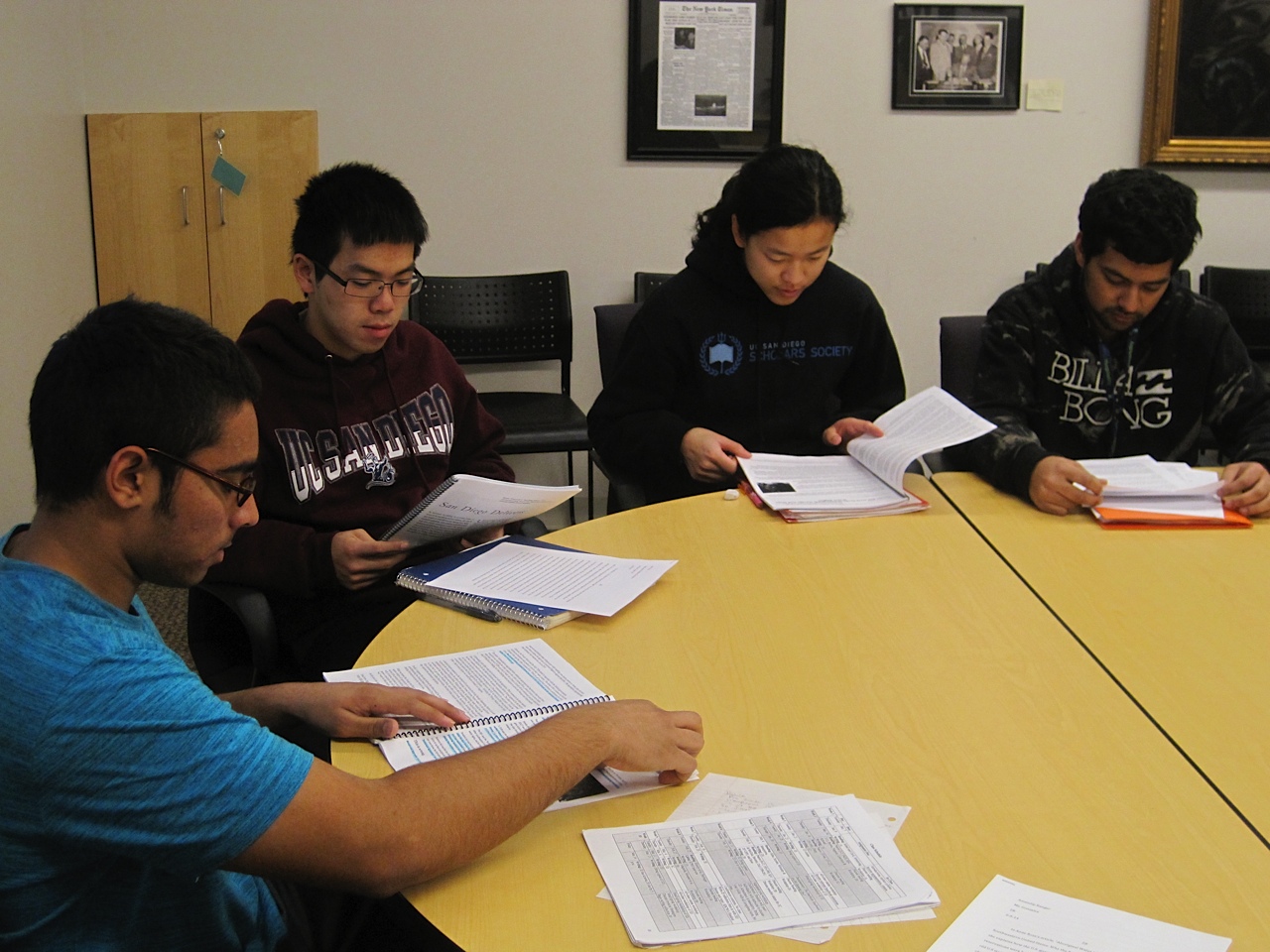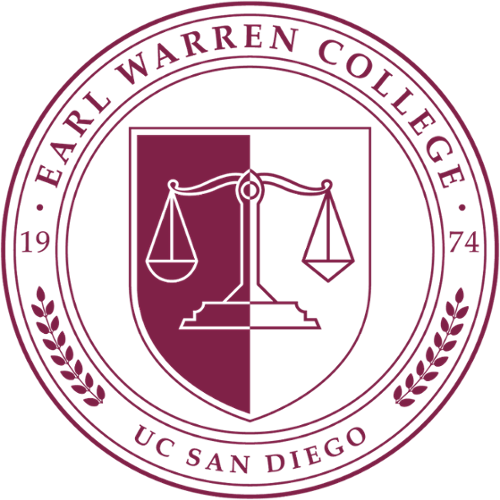WCWP 100
Writing for Discovery and Impact
WCWP 100 is an upper-division writing course required of Warren College transfer students. Inspired by the college motto "Toward a Life in Balance," students from different majors collaborate to investigate a big social question and problem that is out of balance and that resists simple answers.
In small workshop seminars, students question common myths about writing, moving beyond formulaic essay writing toward reflective, critical thinking and authentic, meaningful communication. Through class assignments, students experience reading and writing as processes of deep inquiry and discovery. In their capstone projects, students explore the course’s big social question, connecting their lived experiences with academic research. In this process, students discover how writing moves beyond the university to shape public conversations and impact people and communities.
2025-2026 Course Topics
Writing with the Machines
Professor Mark Young
Required texts: Course reader
Available at the UCSD Bookstore.
A decade ago, the advancement of machine-learning algorithms and next-generation automation signaled a sea change in technological progress and inspired a wave of academic thought focused on the future of employment and how education might keep pace with the flow of innovation. Most notable among these efforts was the The Second Machine Age, the best-selling work by MIT professors Erik Brynjolfsson and Andrew McAfee, whose advice to young people centered on “racing with the machines”— adapting to new technology and working to showcase the best of what humanity has to offer.
Fast forward to the age of Generative AI, which heralds a further paradigm shift in our collective relationship to technology and occasions not only a fresh look at the existing academic guidance for its use but also the opportunity for hands-on exploration of how such innovation may—or perhaps may not—serve humanity in its pursuits, be they ethical, educational, financial, political, or artistic.
Over the course of this quarter, we will experiment with and adapt Brynjolfsson and McAfee’s advice by “Writing with the Machines,” using that theme as both a lens for examining and contributing to contemporary debates and a practical test to explore the boundaries of usefulness for integrating Generative AI technology into the process-based and collaborative writing classroom.
My sincere hope is that this course, in addition to fostering myriad academic and professional literacies, provides you new tools to inject your voice into the civic life of your community and emboldens your contribution to the project of building the future.
Fast forward to the age of Generative AI, which heralds a further paradigm shift in our collective relationship to technology and occasions not only a fresh look at the existing academic guidance for its use but also the opportunity for hands-on exploration of how such innovation may—or perhaps may not—serve humanity in its pursuits, be they ethical, educational, financial, political, or artistic.
Over the course of this quarter, we will experiment with and adapt Brynjolfsson and McAfee’s advice by “Writing with the Machines,” using that theme as both a lens for examining and contributing to contemporary debates and a practical test to explore the boundaries of usefulness for integrating Generative AI technology into the process-based and collaborative writing classroom.
My sincere hope is that this course, in addition to fostering myriad academic and professional literacies, provides you new tools to inject your voice into the civic life of your community and emboldens your contribution to the project of building the future.
The Garden in the Machine
Professor Niall Twohig
This course takes your college motto – toward a life in balance – as inspiration. Implicit in this motto is that life is out of balance, that the scales have tipped, that a counterweight is needed to restore balance.
The evidence of this imbalance is all around us. We see it in the call for renewed fracking as the world burns; in the rise of artificial intelligence alongside declining literacy rates; in increased protections for corporate persons alongside vanishing rights for vulnerable populations; in the fact that eight men own more wealth than 3.6 billion people; in the gulf separating the salaries of financiers from social workers, weapons developers from caregivers, bankers from teachers.
This course will give you a chance to articulate the feelings that come from life out of balance. But we will not stop there, with the scales tipped. Facing this imbalance, we will turn to a tradition that provides a counterweight: Humanism. The humanist tradition tends to those facets of our species atrophied by the imbalance: to our minds and hearts, to our existential struggles and freedom dreams, to art capable of expressing our struggles and dreams. Connecting with this tradition, we will recall and reclaim what it is to be human. We will slow our pace, talk and listen to each other, think critically through existential questions, learn from wise writers, and practice articulating our inner worlds through our written words.
The Four Futures
Professor Keith McCleary
Required texts: Course reader
Available at the UCSD Bookstore.
Is our future predetermined? To what degree do we have individual and collective agency over our society as it progresses? How do we evaluate differing interpretations of the world we live in?
Within this course, we’ll consider these questions inside a critical framework. In Unit 1, we’ll discuss the relationships and intersections between technological innovation and the natural world in the 21st century. In Unit 2, we’ll look at how sociopolitical inequality and various fields of advanced academic study are both impacting, and impacted by, these two significant components of the modern world.
In a practical sense, this course is focused on text-based argumentative writing. The final papers and projects in this class will ask you to take a critical stance on at least one of the readings in each unit, either by challenging some aspect of that reading, pointing out ways to expand its ideas using another text, or perhaps by synthesizing multiple readings that are each somehow incomplete or lacking on their own.
Put another way: each unit asks you to identify problems with how at least one text presents its ideas, and to support your argument with an increasing array of evidence.
The first unit focuses solely on textual evidence. It is designed both to strengthen students’ use of evidence in other disciplines, and to provide a new challenge to students who may already hail from writing-intensive majors. The second unit combines textual analysis with the use of personal narrative, and invites students to add outside sources to the course readings. In addition, the class offers practice in feedback and revision, reflection, and group work.
Schedule and Registration
Winter 2026 Class Schedule
|
Sect |
Day |
Time |
Room |
Instructor |
Topic |
|---|---|---|---|---|---|
| A00 | MW | 12:30PM - 1:50PM | WSAC 132 | Keith McCleary | The Four Futures |
| B00 | MW | 3:30PM - 4:50PM | WSAC 132 | Keith McCleary | The Four Futures |
| C00 | MW | 5:00PM - 6:20PM | WSAC 132 | Keith McCleary | The Four Futures |
| D00 | TTh | 9:30AM - 10:50AM | WSAC 101 | Niall Twohig | The Garden in the Machine |
| E00 | TTh | 12:30PM - 1:50PM | WSAC 101 | Niall Twohig | The Garden in the Machine |
| F00 | TTh | 2:00PM - 3:20PM | WSAC 101 | Niall Twohig | The Garden in the Machine |
| G00 | TTh | 11:00AM - 12:20PM | WSAC 132 | Mark Young | Writing with the Machines |
| H00 | TTh | 2:00PM - 3:20PM | WSAC 132 | Mark Young | Writing with the Machines |
| I00 | TTh | 3:30PM - 4:50PM | WSAC 132 | Mark Young | Writing with the Machines |
** If viewing on a phone, please turn it horizontal.
Registration and Prerequisites
Prerequisite: Completion of IGETC, or equivalent transfer agreement. WCWP 100 is open to Warren College students only, and can only be taken for a letter grade.
It is recommended you complete WCWP 100 in your first year at UCSD to prepare you for your other courses and to prevent possible delays in completing your graduation requirements.
Transfer students who have completed a lower-division writing course at another college do not need to take WCWP 10A or 10B. Most transfer students only need to take WCWP 100. It does not matter when it is taken, but it is recommended you complete the course within your first year at UCSD. Students with less than 90 units are blocked from enrolling. Please submit an Enrollment Authorization System (EASy) request - including transcripts if necessary - for clearance if you have fewer than 90 units on record.

